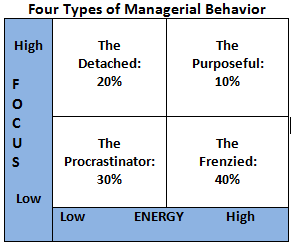Purposeful Leaders: Are you Part of the 40% or 10%?
Are you a purposeful leader? If so, you’re in the minority. According to a 10-year research project, only 10% of managers are purposefully engaged, highly focused and energetic.
This is according to Heike Bruch’s and Sumantra Ghoshal’s study, published in A Bias for Action, (Harvard Business Press, 2004).
“By its very nature, a manager’s job leaves little room for reflection,” Bruch and Ghoshal contend, “and as a result managers tend to ignore or postpone dealing with the organization’s most crucial issues.”
I know I hear such complaints in the work I do with business owners. Most have a hard time keeping focused on what truly matters and ignoring the demands that only seem important but need to take a back seat.
Here’s what the authors’ research revealed:
- The Frenzied: Forty percent of managers are distracted by the overwhelming tasks that face them each day. They are highly energetic, but unfocused; they are enthusiastic about their work and identify strongly with their jobs. But “the need for speed” prompts them to be unreflective. They can achieve more if they consciously concentrate their efforts on what really matters.
- The Procrastinators: Thirty percent of managers procrastinate on doing their organizations’ most important work. They lack both energy and focus, spending their time handling minor details in lieu of what could make a real difference to their organizations.
- The Detached: Twenty percent of managers are disengaged or detached from their work. They can be focused, but have no energy. They seem aloof, tense and apathetic.
- The Purposeful: Only 10 percent get the job done. They are highly focused, energetic, and come across as reflective and calm amid chaos.
What’s been your experience juggling all the demands for your attention? How can business owners and managers stay focused so that they are truly purposeful leaders? How can they overcome constant distractions and interruptions and learn to take “purposeful action” rather than drowning in the day-to-day deluge of email, phone calls and meetings?
That’s what we’ll look at in my next post, coming up.










